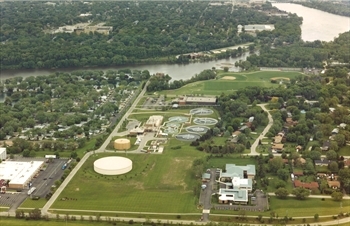 By Kyla Jacobsen
By Kyla Jacobsen - January 31, 2013
Experiencing Drought is a series of guest profiles by public works officials on the impacts of drought on northeastern Illinois communities. This is the third in the series, view other posts from the Experiencing Drought series. For more information, please contact Abby Crisostomo at acrisostomo@metroplanning.org.
Municipality: Elgin, Ill.
Water Source: Fox River and deep groundwater aquifers
Issue: Water treatment plant overrun by algae-induced water quality problems due to low water levels in the Fox River
Outcome: Large expenses for treatment processes and staff overtime to handle the effects of drought highlight the need to find other ways to reduce water treatment challenges
The Midwest’s ongoing drought has caused problems for water utilities across the state. Most utilities’ challenges have been quantity related – for instance, inadequate source water meeting with higher demand. But here in Elgin, quantity wasn’t our problem; instead, it was quality.
Elgin’s water utility serves our community of 108,000 people, as well as wholesales water to the villages of Sleepy Hollow and Bartlett. Elgin’s primary drinking water source is the Fox River. The Riverside Water Treatment Plant, which went online in 1982, was constructed so that Elgin could maximize the use of the Fox River and reduce our dependency on the rapidly declining aquifers; the goal was to strive for 100 percent river water treatment. However, Elgin still has 11 deep wells and calls on them from time to time, mainly to keep them in operating condition.
Our water quality challenges actually started back in March 2012. Already then, our region was experiencing unseasonably high temperatures, and Elgin saw increased boat activity on the river and increased turbidity, or cloudiness, of the river water. By June, the biological activity (in short, algae) in the river had increased.

Riverside Water Treatment Plant
I connected with Aurora’s water production superintendent because Aurora and Elgin are the only two communities that use the Fox River as a drinking water source. Aurora’s solution was to add much more well water, minimizing Fox River water to 25 percent of their water supply. In Elgin, we also turned on our wells in hopes of “diluting” the river water. However, our Airlite Water Treatment Plant, which pumps only well water, is currently out of service undergoing a much-needed renovation. This eliminated five of our 11 wells. Of the remaining six wells normally available to our Riverside Water Treatment Plant, only 2 of these were operational due to mechanical problems with the other four. In the grand scheme of things, those two wells provided just 2.3 million gallons of the 25 million gallons we were producing – or about 10 percent of our flow, which was not enough to address the quality issues.
Back in March, we were already increasing the use of some of our treatment chemicals. By June, we were adding additional coagulants on a regular basis, trying to address the turbidity. We tried chlorinating our basins and the process water – initially weekly, but eventually daily -- to reduce the biological activity, but we met without success, so we abandoned that tactic. Into the summer months, our coagulant dosages continued to increase.
Algae was not only out of control in the river, it was also increasing levels within our treatment basins. Ultimately, this led to clogged water filters in our treatment plants, requiring us to move from washing filters every 80 hours to every 8 hours – a huge shift requiring additional resources.
In August, our treatment process finally began to address the turbidity with coagulation by using polymers. As Murphy’s Law would have it, just when we thought we were past the nightmare, we had trouble getting that product due to Hurricane Isaac.
Ultimately, Elgin spent $400,000 over and above our normal chemical budget and used approximately 280 hours in overtime during a two-week period to get the water treatment process under control and ensure Elginites had quality drinking water. We also needed extra people: some dedicated solely to washing filters; others to batch polymer, which we fed into the system in three locations; and others to take extra turbidity samples. It really wasn’t until the first of November that our treatment process was “back to normal.”
Elgin currently does not implement any water use restrictions. There is a provision in our municipal ordinance that could have been implemented, but was not. Going forward, Elgin is committed to implementing conservation initiatives to help prevent peaks in water usage. Conservation, combined with better raw water quality, our Airlite Water Treatment Plant back on line by the end of 2013, and operational wells, will ensure that Elgin will not experience the 2012 water quality challenges again!
Kyla is the Water Director for the City of Elgin. She has a Master’s degree in Environmental Engineering from Illinois Institute of Technology and has been working in the field of water treatment for 27 years.